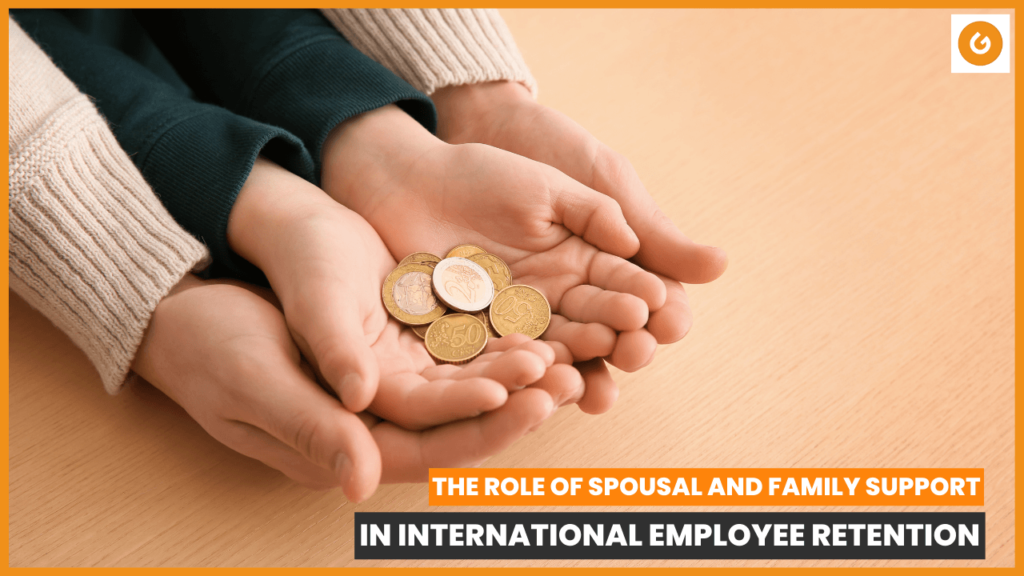In today’s globalized economy, multinational companies often rely on international employees to expand their business, tap into new markets, and foster collaboration among teams. However, retaining these valuable employees can be challenging due to the unique personal and professional challenges they face while living abroad. This article explores the significant role that spousal and family support plays in international employee retention, as well as the steps that employers can take to provide a supportive environment for their international workforce.
Quick Navigation
The Challenges of International Assignments

International assignments bring a variety of challenges that can impact an employee’s overall satisfaction and commitment to their job. These challenges include:
- Cultural adaptation: Adjusting to a new culture and its customs, values, and social norms can be a significant hurdle for international employees and their families.
- Language barriers: Limited proficiency in the host country’s language can create communication difficulties in both professional and personal settings.
- Work-life balance: The demands of an international assignment can disrupt the balance between work and personal life, leading to stress and burnout.
- Homesickness and isolation: Being far from one’s home country and support network can exacerbate feelings of loneliness and isolation.
The Impact of Spousal and Family Support
A strong support network of spouses and family members can greatly influence an international employee’s experience abroad. This support can positively impact:
- Emotional well-being: A strong family support system can help alleviate feelings of homesickness and isolation, improving an employee’s overall emotional well-being.
- Job satisfaction and commitment: Employees with supportive families are more likely to feel satisfied with their job and remain committed to their organization.
- Overall performance and productivity: Employees who feel supported by their family tend to be more engaged, motivated, and productive in their work.
Spousal Adjustment and Career Concerns
International assignments can pose challenges for spouses as well, particularly when it comes to their own careers and professional development. Employers should consider:
- Dual-career couples: Many international employees have spouses who also work, and it is essential to address the career needs of both partners.
- Employment opportunities for spouses: Providing job placement assistance and networking opportunities can help spouses find fulfilling work in the host country.
- Professional networking and community building: Establishing connections with local professionals and expat communities can help spouses build a supportive network.
Children and International Assignments

The well-being of an employee’s children is a crucial factor in their ability to succeed in an international assignment. Employers should address:
- Education and schooling options: Providing information about local schools and educational resources can help families make informed decisions.
- Social integration and friendships: Encouraging social activities and opportunities for children to make friends can ease their transition to a new culture.
- Cultural identity development: Exposing children to their home culture while embracing the host country’s culture can help them develop a strong sense of identity.
The Role of Employers in Supporting Families
To ensure the success of international assignments, employers should provide comprehensive support to employees and their families. This can include:
- Pre-departure preparation and training: Offering cultural training and language courses to employees and their families can help them adapt more easily to their new environment.
- Family-friendly relocation packages: Employers should consider the unique needs of families when developing relocation packages, including housing, schooling, and spousal employment support.
- Ongoing support and resources: Providing continuous support through resources, counseling, and assistance can help families navigate the challenges of living abroad.
Key Elements of Effective Spousal and Family Support Programs
Effective support programs should address the unique needs of international employees and their families. Some key elements of these programs include:
- Cultural training and language courses: Providing families with training in the host country’s culture and language can ease their transition and promote effective communication.
- Family and spousal networking opportunities: Facilitating connections between expat families and local communities can help them build supportive networks, reducing feelings of isolation.
- Access to healthcare and mental health services: Ensuring that employees and their families have access to quality healthcare and mental health services can promote overall well-being.
Related: Benefits of International Employee Assistance Programs
Success Stories: Companies with High International Employee Retention
Examining the practices of companies with successful international employee retention can provide valuable insights and best practices:
Case study 1:
- A global technology firm that offers comprehensive family support, including pre-departure training, spousal career assistance, and children’s education resources, has experienced higher retention rates among its international workforce.
Case study 2:
- A multinational pharmaceutical company that prioritizes family support and work-life balance has seen increased employee satisfaction and loyalty, contributing to its strong international employee retention.
- Lessons learned and best practices: These success stories demonstrate the importance of investing in family support and creating a culture that values work-life balance for international employees.
The Economic Benefits of Focusing on Spousal and Family Support
Companies that invest in spousal and family support programs can reap significant economic benefits, including:
- Reduced turnover costs: By retaining international employees, companies can save on the costs associated with recruiting, hiring, and training new talent.
- Improved organizational reputation: A company’s commitment to family support can enhance its reputation, making it more attractive to prospective employees and clients.
- Higher levels of employee engagement and loyalty: Employees who feel supported by their organization are more likely to be engaged, productive, and loyal, leading to better overall performance.
Practical Tips for Employers to Improve Spousal and Family Support
Employers looking to enhance their spousal and family support programs can consider the following strategies:
- Open lines of communication: Encourage employees to share their concerns and needs with management, and be responsive to their feedback.
- Tailoring support to individual needs: Recognize that each family’s situation is unique, and offer flexible support options that can be customized to their specific circumstances.
- Involving employees in decision-making processes: Engage international employees in the development and implementation of family support programs, ensuring their needs are addressed and their voices are heard.
Building a Global Community for International Employees

Fostering a sense of belonging among international employees and their families can contribute to their overall satisfaction and commitment to the organization. Employers can take steps to create a global community by:
- Organizing social events and activities: Regularly hosting events and activities for international employees and their families can help build connections and create a sense of community.
- Encouraging mentoring and buddy programs: Pairing new international employees with more experienced colleagues or other expats can provide valuable guidance and support throughout their assignment.
- Providing platforms for communication and collaboration: Creating online forums or social media groups for international employees and their families can facilitate the sharing of experiences, resources, and advice.
Evaluating and Measuring the Impact of Spousal and Family Support Programs
To ensure the effectiveness of spousal and family support programs, employers should regularly evaluate and measure their impact on employee retention, satisfaction, and overall performance. This can be achieved through:
- Employee surveys and feedback: Conducting regular surveys and collecting feedback from international employees and their families can provide valuable insights into the effectiveness of support programs.
- Retention and turnover metrics: Tracking retention and turnover rates among international employees can help measure the impact of support programs on employee commitment and loyalty.
- Performance evaluations and productivity metrics: Assessing the performance and productivity of international employees can offer insight into the correlation between family support and overall employee success.
Spousal and family support plays a critical role in international employee retention, and investing in comprehensive support programs can lead to significant economic and organizational benefits. By understanding and addressing the unique challenges faced by international employees and their families, employers can create a more inclusive and supportive global workforce, ultimately leading to increased employee satisfaction, loyalty, and overall success. Implementing the strategies discussed in this article can help companies retain their valuable international talent and foster a thriving, engaged global community.
Common FAQs
Why does spousal and family support impact international employee retention?
Support impacts emotional well-being, job satisfaction, and overall performance, leading to higher commitment and retention rates.
How can employers assist spouses’ career development during international assignments?
By addressing dual-career couples’ needs, offering job placement assistance, and fostering professional connections.
What should employers consider for children during international assignments?
Addressing education, social integration, and cultural identity development to help children adjust and thrive.
How can the effectiveness of spousal and family support programs be measured?
Through employee surveys, tracking retention and turnover rates, and assessing performance and productivity.
What practical tips can help employers improve spousal and family support?
Maintaining open communication, offering tailored support, and involving employees in decision-making processes.









